#one piece danjirou
Text

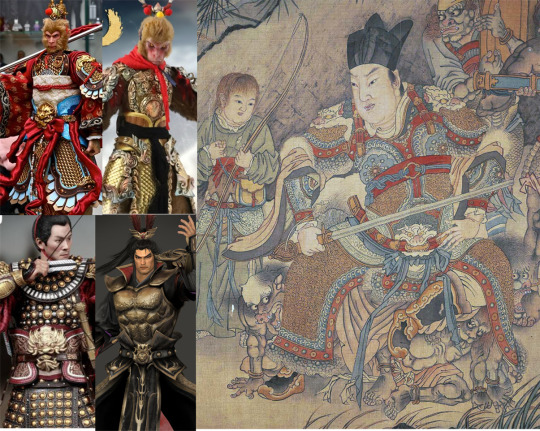

Shihouin[四楓院] Chika[千日]
Shi[四]: "4"
Hou[楓]: "Maple(tree)"
In[院]: "Temple/House(of governmetn)/Institution"
Chi[千]: "1,000"
Ka[日]: "(The)Sun"/"Day"
Given the naming pattern with Yoruichi and Yuushirou reading "Night 1" and "Night 4 Son", it would follow that Chika's name here reads as "1000 Days" or "1000th Day" A curious notion when the Shihouin crest has a moon on it, which was obviously where the night motif in the later heirs came from. Is Chika a blacksheep of the family for not having a night name? Or did the Shihouin change their motif at some point from day/sun to night/moon?
And very noticeably he's wearing what looks like a chinese style of lamellar belt(it's hard to say when there isn't an accompanying suit of armor to go with it) but it evokes to me a lot of Ming dynasty period pieces(or alternatively very anime-ass Romance of the Three Kingdoms designs) and incidentally Journey To The West was written in the Ming Dynasty, and combined with his complexion and his distinctive Xiangyun[祥云]:"auspicious clouds" scarf (and of course my ongoing crackpot theory about there being an unspoken theme of pre-Japanese Buddhism underlying the foundation of Soul Society) makes me think he's specifically Indian but having travelled East across China(or whatever the Soul Society equivalents are)


Izuhara[嚴原] Kinroku[金勒]
Izu[嚴]: "Strict/Stern"
Hara[原]: "Plain/Field/Wilderness"
Kin[金]: "Gold"
Roku[勒]: "Bit/Bridle(like a horse's)"
Makes him sound like a wild stallion type who was only tamed by being bribed with wealth and luxury. At first glance I had pegged him for a cold corporate or medical type, but looking at him again he has a certain yakuza look about him too. Less an overt thug and more a grifter, a penny pincher, a coldblooded loan shark type, and this name seems to vibe with that. It's hard to tell but it looks like he has the archetypal yakuza/laborer bellywarmer like Tetsuzaemon did too.
Shijima[志島] Chikiri[知霧]
Shi[志]: "Will/Resolution/Ambition"
Jima[島]: "Island"
Chi[知]: "Wisdom/jnana"
Kiri[霧]: "Mist/Fog/Haze"
Same root word Shi[志] as in the Shiba family and in Okikiba Genshiro's given name. Weird that all three of these are associated with the water; waves/ripples, islands, and distant waters.
The given name is fun because it seems to describe him as wise but in a hazy way, his wisdom is obscured or unclear; whether that means it's unclear to others, or even to him isn't clear. Either one seems to fit his kind of disheveled appearance.
Now that we can see him properly, he kind of reminds me of Wonderweiss.

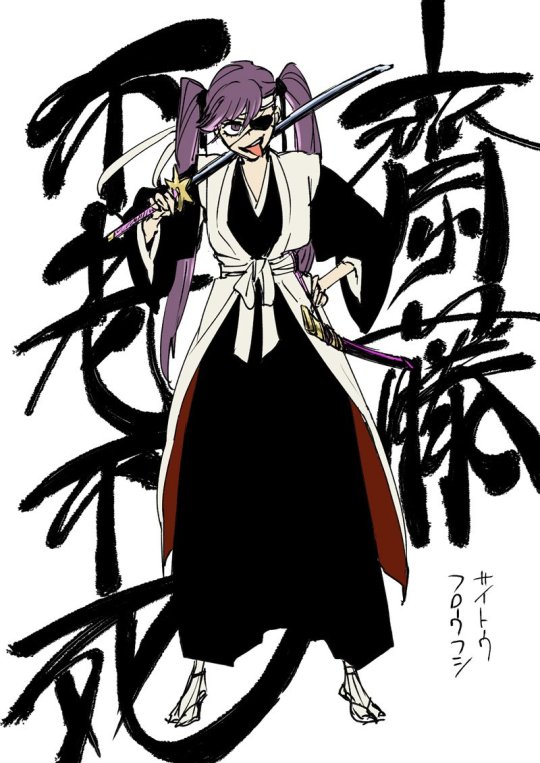
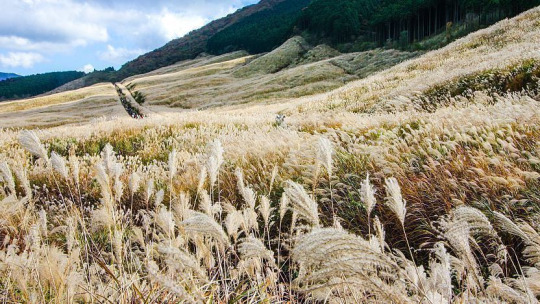
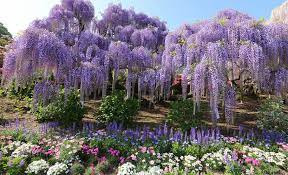
Obana[尾花] Danjirou[彈児郎]
O[尾]: "Tail"
Bana[花]: "flower"
Dan[彈]: "Bullet/Pellet/(musket)Ball"
Ji[児]: "newborn baby"
Rou[郎]: "son"
On the one hand the compound [尾花] appears to refer to "(ear of) Japanese pampas grass" which is also known as the Chinese Silver Grass. But it's also part of the compound [鸟尾花] refering to the Crossandra infundibuliformis, the Firecracker Flower. And also [鸢尾花] referring to irises in general. Since, as the 5th division captain, he's not the one with an iris insignia, I'm going to go with the silver grass reference. It does evoke a certain rugged and pastoral landscape that seems to suit the rustic almost hick-ish vibe he has going on.
As for Bullet baby.... I have no idea what to make of it...
Saitou[齊藤] Furofushi[不老不死]
[齊]: "...-Like/as if..."
[藤]: "Wisteria"
[不老]: "No grow old"
[不死]: "No die"
"Wisteria-like" has obvious evocations in her hair color and pigtails. The given name all together is actually a phrase meaning "immortality/perpetual youth." Pretty straight forward.
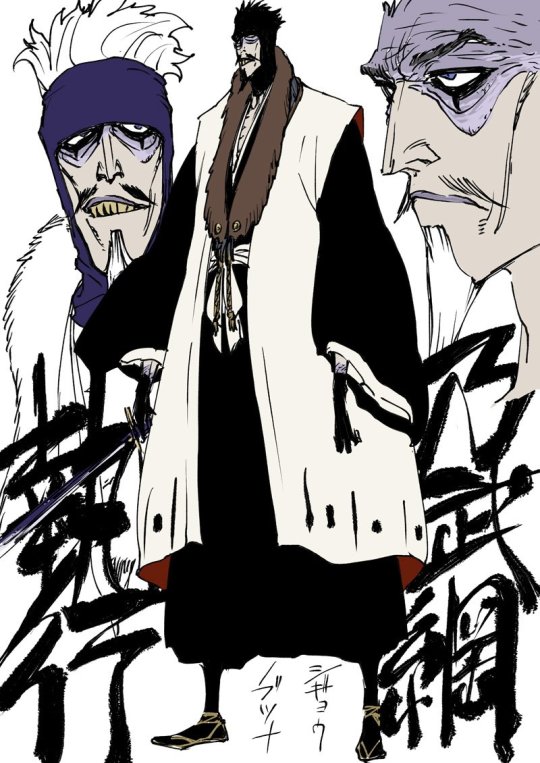
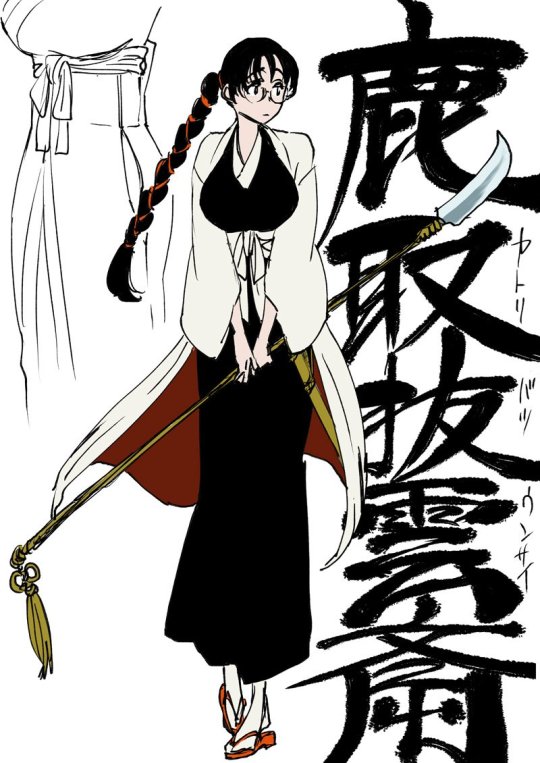

Shigyou[執行] Nobutsuna[乃武綱]
Shigyou[執行]: "execution/enforcment"/"executive/executor"*
No[乃]: "<possessive indicator>"
Bu[武]: "Military/Martial"
Tsuna[綱]: "Cord/Rope"
*can also refer to a "lead monk performing various tasks in a (buddhist)temple" although his overall appearance is anything but monk-like; certainly there are other captains here that would suit that reading better. So, the "rope or military enforcement."
(The random 3rd division guy with the "Winter Whistle" sword was named Taketsuna[武綱])
Katoribatsu[鹿取抜] Unsai[雲齋]
Ka[鹿]: "Deer"
Toribatsu[取抜]: "Drain/Extract"
Un'[雲]: "Cloud"
Sai[齋]: "<indicates a penname>"
Ok, first of all... "Deer Extraction"??? And then her given name is either "Penname: Cloud" or if taken together [雲齋]: "cotten drill" as in the twill weave fabric used for things like khakis?? But that feels like a weird way to go. She is quite bookish looking (i mean... as if she can avoid it in the proximity of Nanao and Risa...) so perhaps she's an author on the side? Hence the penname. But as for the deer collecting... it feels like a weird way to phrase it, but I'm assume it's trying to conjure a disney princess-like scene of her attracting deer to her to show her purity and trustworthiness? Maybe???
Also she has a distinctive, Zhōngguó jié[中國結]: "Chinese knot" ornament at the end of her naginata(?) which wasn't shown in the poster. Although the coloration on this sheet is oddly gold rather than the more typical red. What is probably the most common and recognizable design is the Pán zhǎng jié[盤長結], sometimes called an "endless knot" or "eternal knot" and is used to represent various Buddhist virtues.
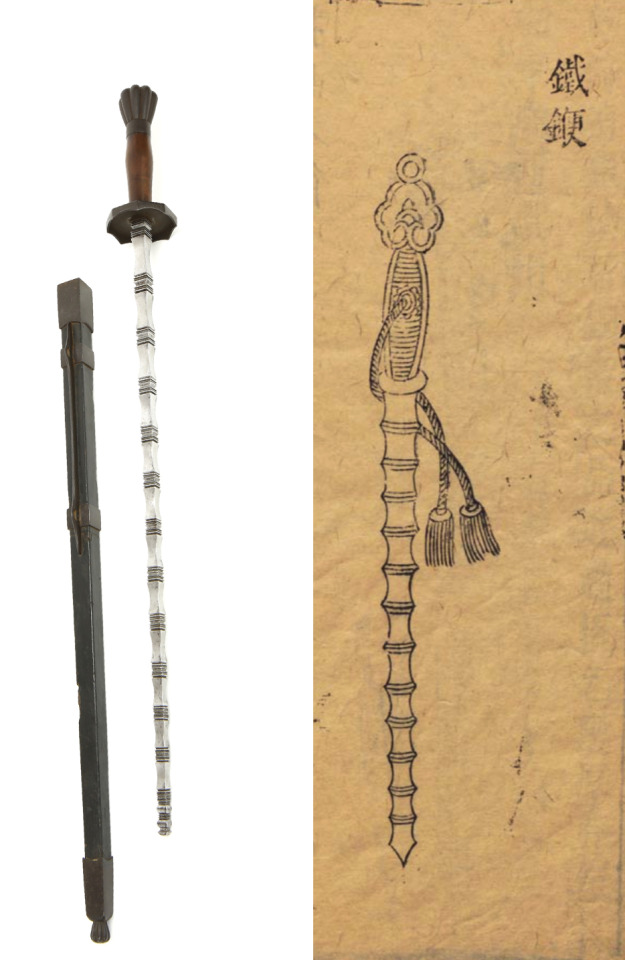

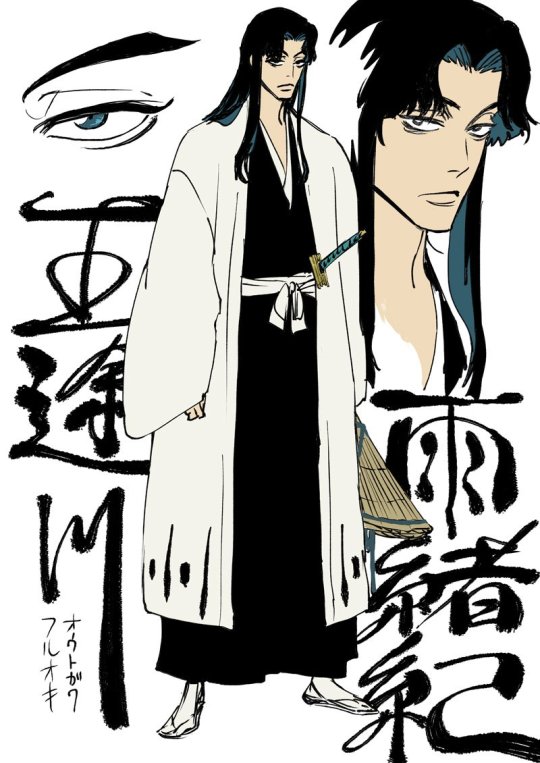
Kumoi[久面井] Entetsu[煙鐵]
Ku[久]: "A long time"
Mo[面]: "Face/Mask/Surface"
I[井]: "Well(water source/hole in the ground)"
En'[煙]: "Smoke"
Tetsu[鐵]: "Iron"
He sounds and looks very much like a jailer/torturer, not unlike some vibes Urahara's backstory gave off. Kumoi's zanpakuou is also a Tiěbiān[鐵鞭], a sectioned iron rod, part of a broader family of weapons/tools all called "iron whips."
Interestingly it's the same type of weapon Sui-feng's bankai, Jakuhou Raikouben[雀蜂雷公鞭], is named after.
Outokawa[王途川] Furuoki[雨緒紀]
Ou[王]: "King"
To[途]: "Road/Way"
Kawa[川]: "River"
Furu[雨]: "Rain"
O[緒]: "Cord/String(of an instrument)"
Ki[紀]: "Era/Period(of time)" or "Rule/(Written)Record"
"King's Way River" is a very pompous sounding family name... Interestingly the name Furuoki uses the kanji [雨] for rain, but is pronounced here like furu[降る] which is the verb for "to fall" referring specifically to rain or snow. The "Era of Rain(fall) String." It might be a stretch but I want to interpret that as the lines of rain falling being equated to the string of an instrument, and by proxy comparing the sound of rain fall as music.
But alternatively it could be another play into Kubo's on-again-off-again rain symbolism. Sometimes it's Ichigo's depression, sometimes it's Uryuu's legacy as the last Quincy, sometimes it's Orihime making confusing statements about joining earth and heaven, in direct contradiction to her Tanabata namesake... Is it "The Rule of Rainfall" as in the downpour comes eventually no matter how you run from it? Or as in, heaven and earth are joined eventually if your just wait? Or as in heavens will be clouded over and separated eventually? Or as in, relief comes eventually and even the worst drought can't last forever?
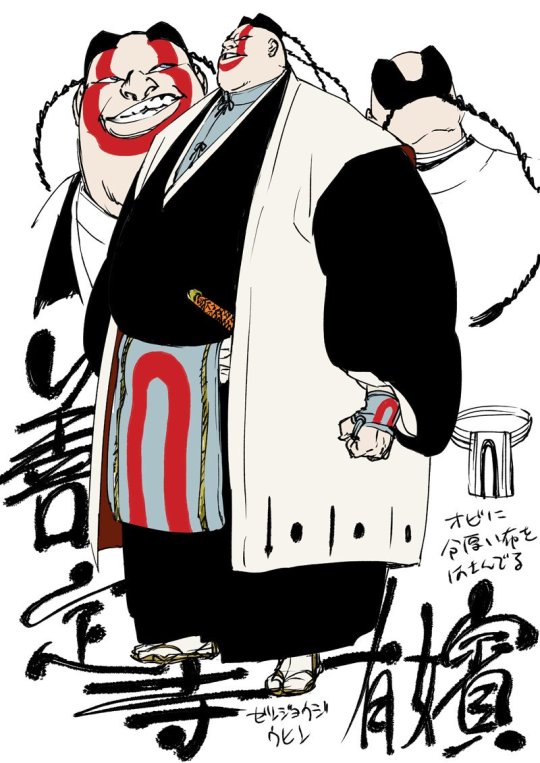
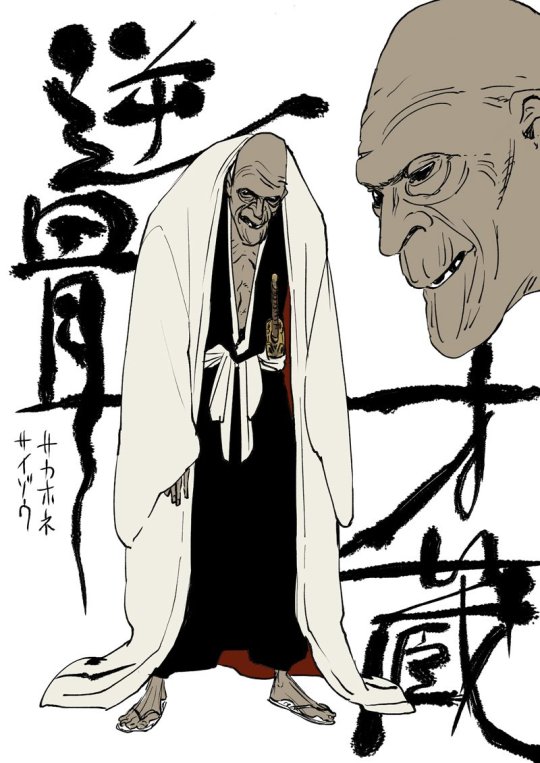

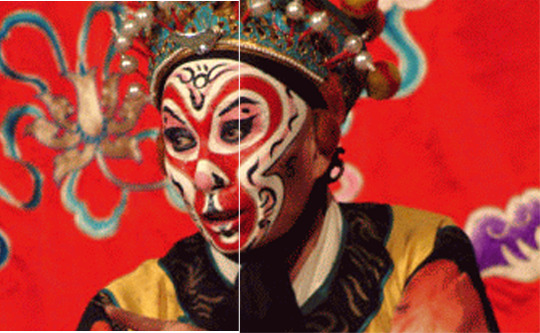
Zenjou[善定] Jiuhin[寺有嬪]
Zen'[善]:"Virtue/Goodness/Good deeds
Jou[定]: "certainty/reality/samadhi"
Ji[寺]: "temple"
U[有]: "bhava/becoming/existence"
Hin'[嬪]: "court lady/virtuous woman/concubine"
So I can't quite tell if Kubo's just leaning into the on'yomi here, or if he's specifically aiming for a Chinese reading. I want to say On'yomi, but it is fairly close to the Chinese reading Shàndìng[善定] Sìyǒupín[寺有嬪] it's just the dìng[定] vs jou[定] throwing a wrench in it. And I'm hung up on Jiuhin's name sounding Chinese because with the mandarin style collared shirt and the fact that he has... for some reason two... queue... it all points to a distinctly Chinese influence in the design.
Arguably the face paint could also be pulled erroneously from the brooder aesthetic of Chinese opera --as in maybe Kubo was going for a Chinese opera inspired look, but what's here definitely isn't accurate to the style-- but it feels very in line with Kubo's own funky sensibilities either way.
Sakahone[逆骨] Saizou[才藏]
Saka[逆]: "Reverse"
Hone[骨]: "Bone"
Sai[才]:"Talent/Ability"
Zou[藏]: "Hidden"
....the idea that this decrepit old man is named "Reverse Bones" as if he's like that because his bones are just "wrong" is for some reason hilarious and horrifying to me. "Hidden Talent" seems self-explanatory given he looks like he should barely be able to move, let alone fight or kill a person.
#bleach#shinigami#gotei 13#not tagging all those#just wanted to give thees all a quick once over while it was slow at work#didn't think too hard about them honestly#but given there's literally no content to cross reference...#I don't know that there's anything i'd have added given more time#mostly just played fast and loose with the visual assocaitions#as ever im really just looking at kanji choice#and not digging around for homonyms and puns all that much
198 notes
·
View notes